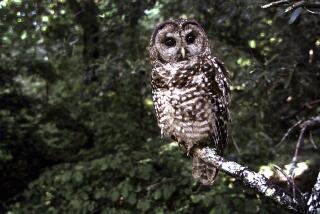Irvine Co. Tries to Forestall Bid to Protect Bird
- Share via
SACRAMENTO — The Irvine Co. has told the Wilson Adminstration that any endangered species designation for the California gnatcatcher must be put on hold before major landowners will cooperate in setting aside land for the threatened songbird in Southern California.
The “condition” was part of a lengthy plan the company submitted to Gov. Pete Wilson’s top environmental official on April 2, aimed at averting a political battle with environmentalists over the fate of the gnatcatcher and other species living in the quickly vanishing coastal sage scrub.
Citing the threat of rampant urbanization, two environmental groups have nominated the gnatcatcher for state and federal protection as an endangered species--a prospect that has unnerved the Irvine Co. and other major Southern California landowners with large stretches of the scrub on their developable land in Orange, Riverside and San Diego counties.
The developers say that such a designation for the gnatcatcher would impede or scuttle their development plans for thousands of acres of the country’s most valuable real estate. Some experts have predicted the brewing political battle over the gnatcatcher will be as ferocious as that waged over the spotted owl in the Pacific Northwest.
Hoping to avoid that, the Irvine Co.--which has about a third of its own holdings at stake--has been quietly working over the last month to persuade the Wilson Administration to become involved in the brewing controversy. The effort paid off Monday when Wilson, as part of his 14-point environmental agenda, unveiled a pilot program that would convene a scientific panel to determine how much of the gnatcatcher habitat should be saved before the bird is listed as an endangered species.
The idea of the scientific panel was actually suggested by the Irvine Co. as part of a “strategy plan” it sent in an April 2 letter to Douglas P. Wheeler, head of the state’s Resources Agency.
“The goal of this approach is to establish a preservation and management program that could assure protection of adequate coastal sage scrub habitat, thereby making any listing of the gnatcatcher and other coastal sage scrub-dependent species unnecessary,” wrote Monica Florian, Irvine Co. vice president for strategic planning.
Florian’s letter expressed the company’s dissatisfaction with the current method of listing endangered species, a system developers say is unfair because it often kicks in after the bulldozers are rolling and sensitive habitat is disturbed. In the letter, Florian advocated a proactive “demonstration” project that aids developers by determining, upfront, which areas should be set aside for the scrub.
Florian suggested that a scientific panel--comprised of conservation biologists acceptable to both environmentalists and developers--recommend by September just how much scrub should be saved.
Then, the state would use those recommendations to fashion specific “habitat conservation plans” to determine what vacant land would be volunteered by private landowners as a scrub preserve and what would be left for development--a tedious process that could take between 18 months and two years.
Meanwhile, Florian wrote that Irvine and other developers were afraid that the current endangered species applications for the gnatcatcher could come to fruition. An emergency application with the U.S. Fish and Wildlife Service could be decided by September; the state would take at least until sometime in early 1992.
Putting all of that on hold would be one of the “prerequisites for this approach to be effective and to enjoy the full cooperation and participation of the major landowner interests with coastal sage scrub habitat,” Florian wrote.
Since the government apparently has no authority to stop the endangered species consideration on its own, the Natural Resources Defense Council, a Los Angeles-based group which began the process, would have to agree to withdraw its federal and state petitions, which were filed jointly with a Massachusetts-based bird observatory.
Joel Reynolds, the NRDC attorney on the case, said Wednesday that his organization is not inclined to drop its case for the gnatcatcher unless it receives promises from the Irvine Co. and other developers to protect the scrub nesting grounds.
“They would have to demonstrate that it’s worth our while, and adequate protections exist in the interim,” Reynolds said. “One of the things we’re most concerned about, and the reason we’ve filed an emergency petition, was our fear that developers will be proceeding with various projects that could threaten the gnatcatcher and its habitat before the listing process is complete.”
Another condition advanced by the company is that the state take the lead in winning the cooperation of all parties involved in the pilot project.
Michael A. Mantell, undersecretary for the Resources Agency, said Wednesday that the Irvine Co.’s demand for deferral of the endangered species listing is a point that will be negotiated as he pulls together all sides for a consensus.
More to Read
Sign up for Essential California
The most important California stories and recommendations in your inbox every morning.
You may occasionally receive promotional content from the Los Angeles Times.













